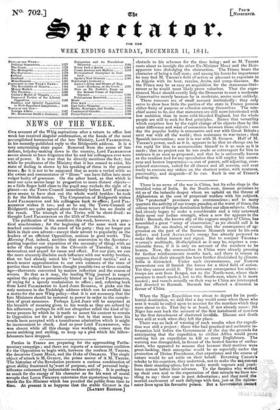Parties in France are preparing for the approaching Parlia- mentary
campaign ; and there are reports of a monstrous coalition for the Opposition to begin with, between the restless M. Tunas, the decorous Count MOLE, and the Duke of ORLEANS. The single object of attack is M. Glamor, the prime mover of it M. TRIERS. The hidtorian of the Revolution presents a curious combination of great ability frustrated by want of purpose, and of personal insig- nificance redeemed by indomitable reckless activity. It is perhaps as much for the energy of his character as for his want of moral scruple that Louis PHILIPPE entertains that mysterious leaning to- wards the Ex-Minister which has puzzled the public from time to time. At present it so happens that the stable GUIZOT is the [Lamm EDITION.] obstacle to his schemes for the time being ; and so M. TRIERS casts about to inveigle the other Ex-Minister MOLE and the Heir- apparent into dislodging the obstruction. The Prince bears the character of being a dull man ; and among his hunts for importance he may find M. TRIERS'S field of action as pleasant to expatiate in as Algeria with its heat, razzias, Arabs, and camp-diseases. So the Prince may be as easy an acquisition for the statesman-litte- rateur as he would most likely prove valueless. That the expe- rienced MoL'i should overtly help the Democrat to oust a moderate Conservative merely because he is moderate, seems most unlikely. These rumours are of small account intrinsically : they only serve to show how little the parties of the state in France possess either fixity of purpose or cohesion among themselves. The mis- chief seems to be, not that statesmen are still more intoxicated with low ambition than in more cold-blooded England, but the whole people are still to seek for first principles. Hence that versatility which surprises less by the rapid change of its objects than by the utter difference and want of connexion between those objects : one day the popular hobby is armaments and war with Great Britain ; next war with all the world ; then resistance to war-taxes ; then Spanish intervention ; now it is war with M. GUIZOT. Half of M. TRIERS'S power, such as it is, appears to be that no change can be too rapid for him to accommodate himself to it as soon as it is made ; that no project can be too crude or extravagant for him to embrace it as soon as proposed ; and that he is universally known as the readiest tool for any speculation that will employ his smart- ness and bestow importance—a sort of patent, self-adjusting, ever- pointed statesman, suited for all classes and all seasons, and ever ready to execute any orders on the shortest notice, with neatness, punctuality, and despatch—if he can. Such is one of France's leading men.


























